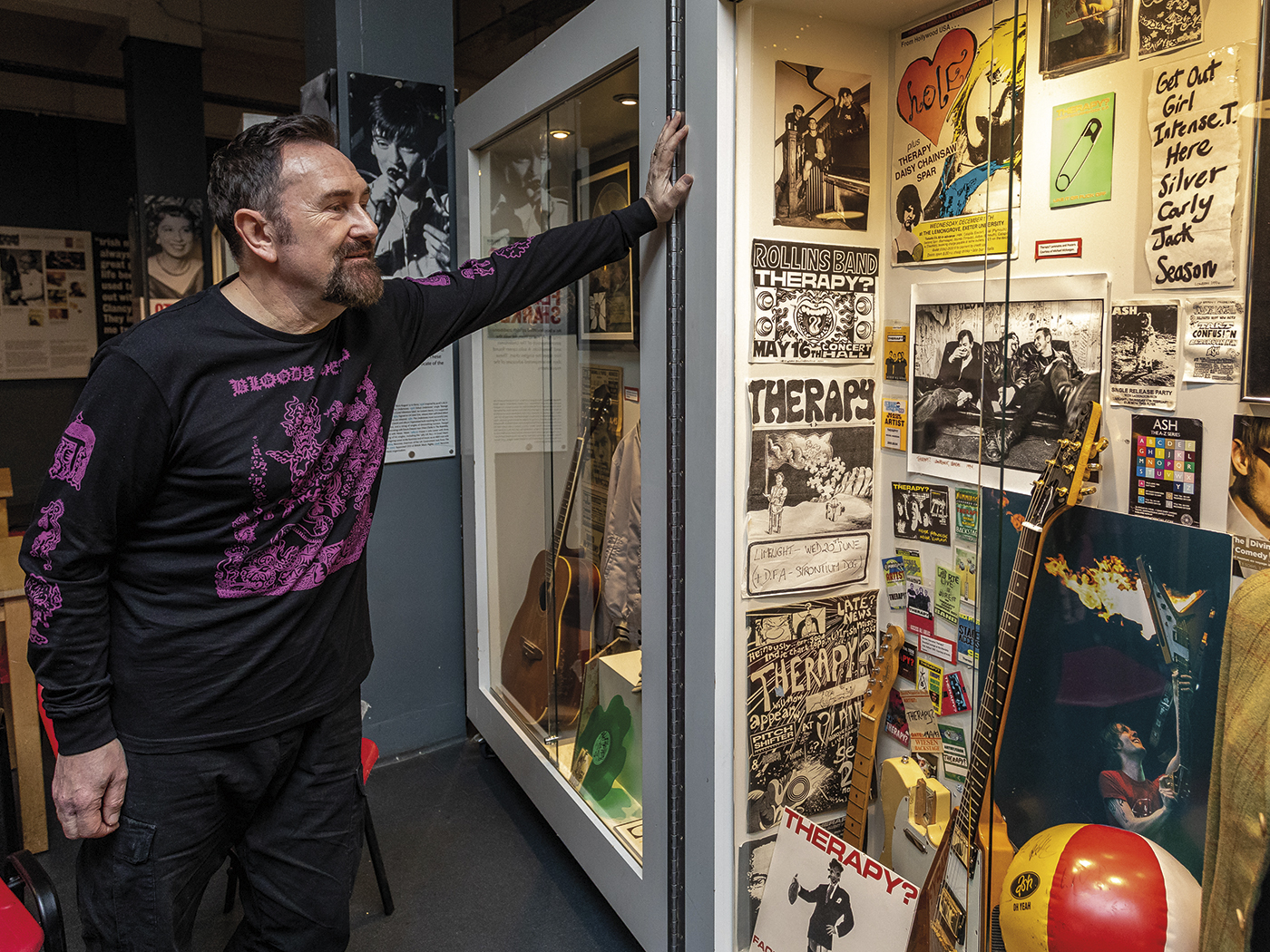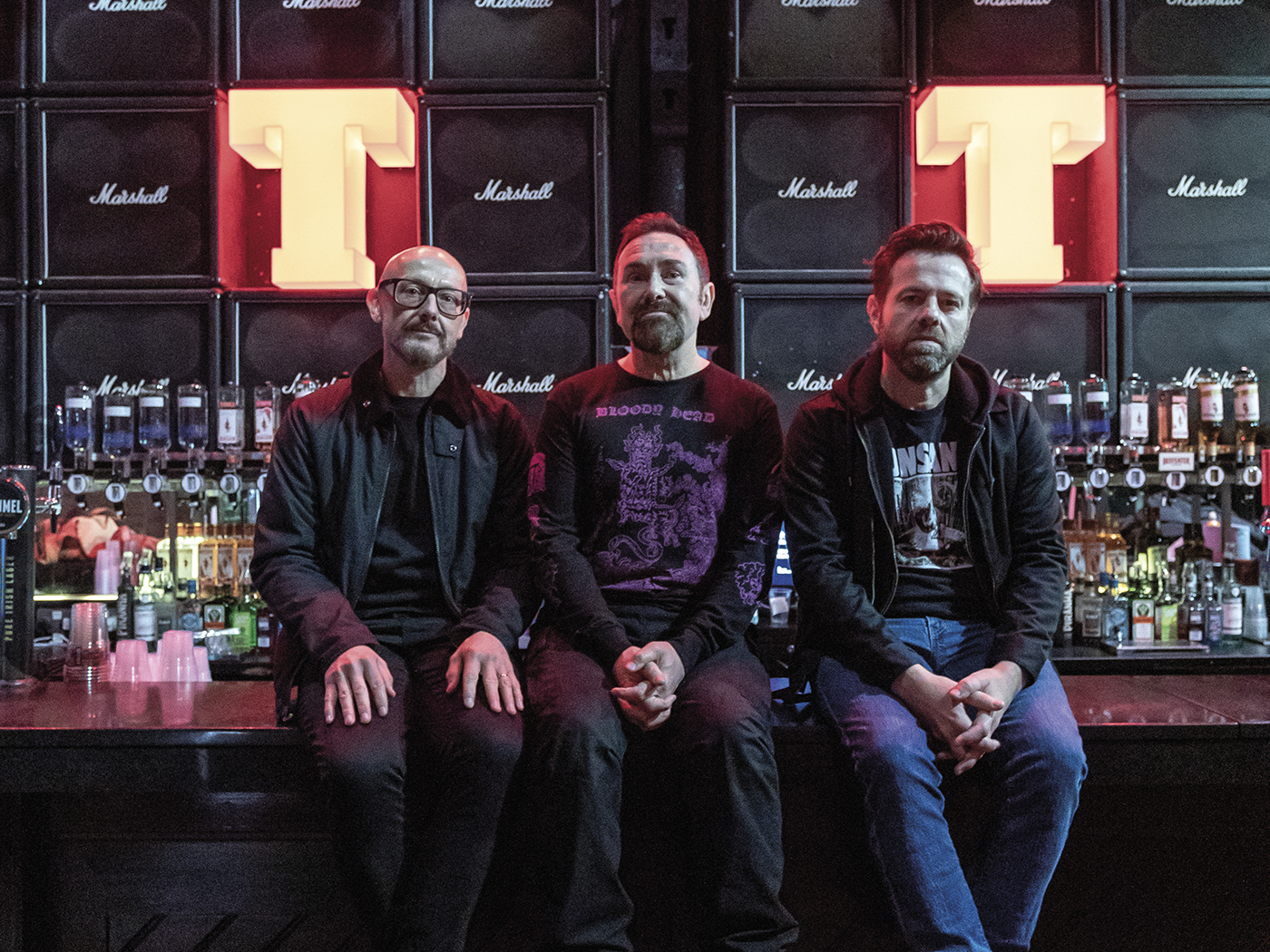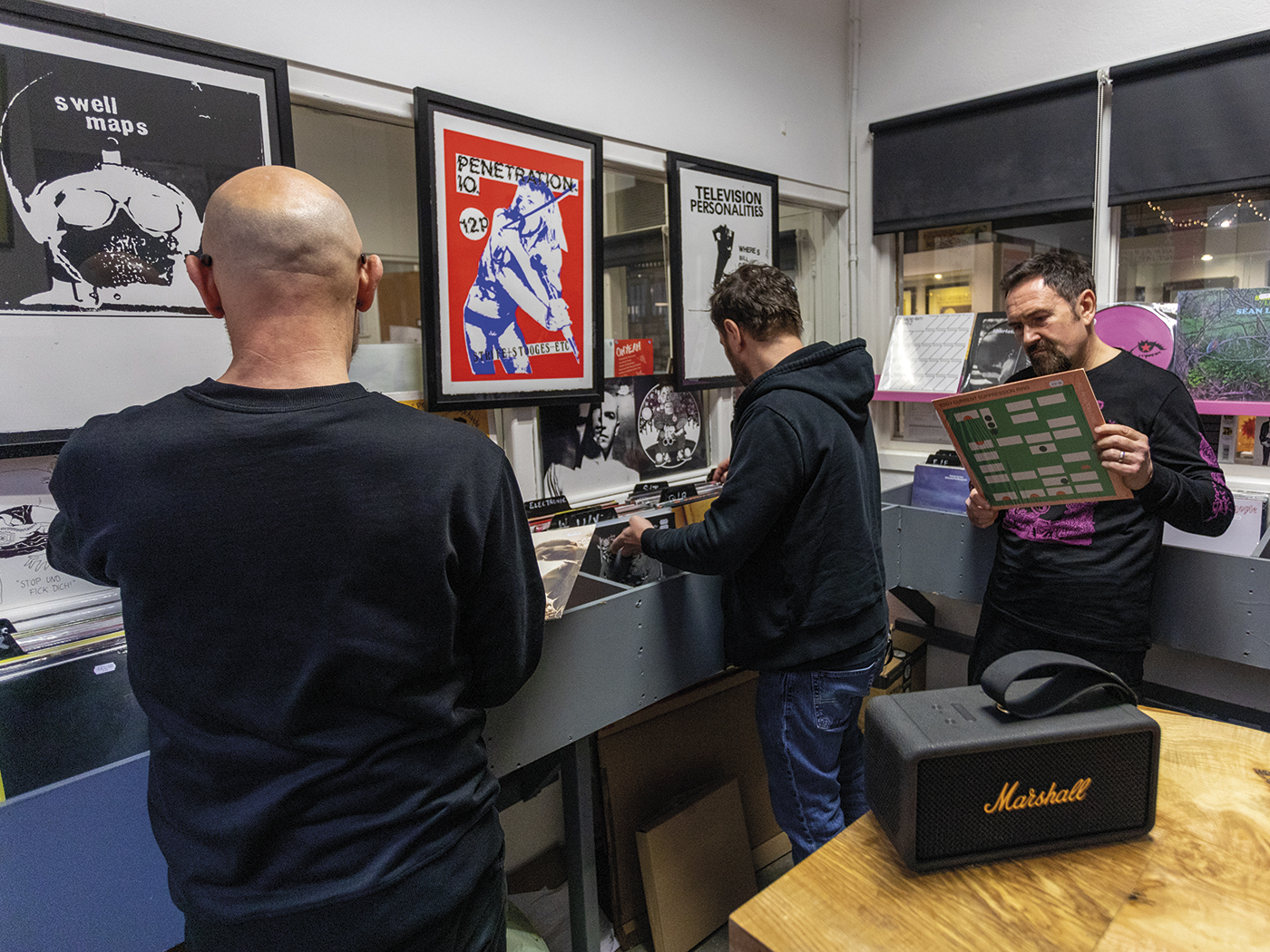City To City: Catching up with Therapy?

In partnership with Marshall
As Andy Cairns stands outside the Limelight club in central Belfast, he recalls a Therapy? show at the venue many years before. Cairns had come straight from his day job at a tyre factory and was changing out of his work clothes in the car park opposite, when his car was surrounded by the RUC demanding to know what was going on. That was par for the course in Belfast during the Troubles, and although the city has changed a great deal over the past three decades, the Limelight is still standing and so are Therapy?.
That instinct for survival informed the name of Therapy?’s most recent album, Hard Cold Fire. Released by Marshall Records and recorded at the label’s studio in Milton Keynes, the title came from Belfast poet Louis MacNeice. “He talks about people from the north of Ireland having a ‘hard cold fire’,” says Cairns. “It’s a reference to the basalt that is indigenous to the terrain, but we thought it represented our longevity. Like Belfast, we have been resilient and determined and we have weathered with time.”
Therapy? were formed by Cairns and bassist Michael McKeegan in 1989. Drummer Neil Cooper joined in 2002, meaning even the new boy has more than two decades of Therapy? under his belt. Hard Cold Fire is a diverse album and the band have always straddled genres, combining rock, punk, metal and industrial noise since debut single “Meat Abstract”. By 1992, Therapy? were enjoying chart success with “Teethgrinder” and “Screamager”, building an audience that remains loyal to this day.
Speaking on a day off between concerts in Dublin and Belfast, Cairns says the band’s success has a lot to do with their early days, when Cairns and McKeegan were immersed in a DIY scene populated by idealistic kids who wanted to escape sectarian strife. “In music, religion didn’t matter,” says McKeegan, something that came as a relief in a town where everything could be examined to discern your background, from your choice of drink to your favoured taxi service. In a city at war with itself, Cairns and McKeegan had to work harder to make things work.
“Music meant more to us,” says Cairns. “Bigger bands wouldn’t come to Belfast and the bands that did tended to be metal, punk and indie. I loved Stiff Little Fingers and The Undertones but I was open-minded. If there was a gig in town, I’d go whether it was Jesus And Mary Chain or Erasure. Finding places to practise wasn’t easy and we only had two record shops, so you had to put the hours in. That’s why we’ve never taken it for granted.”
Hard Cold Fire is Therapy?’s best-selling record since the late 1990s. It followed 2020’s Greatest Hits (The Abbey Road Session), another Marshall album that saw Therapy? refresh some of their biggest numbers for a new audience. “We decided to record our 12 Top 40 hits at Abbey Road in one day,” says Cairns. “Some of these versions are much better than the originals, like ‘Opal Mantra’, which came out very quickly on the back of ‘Screamager’. Now it has more heft and sounds a bit like Killing Joke.”
Therapy? have already been with Marshall for almost a decade. Cairns has seen labels come and go, so speaks from a position of authority when he praises the relationship he has with the label. It’s a company that ticks important boxes and which, like Therapy?, has earned a reputation for endurance.
“I am a sucker for things that work, whether it’s the amps or the Marshall Bluetooth speakers and earbuds,” he says, admitting that he does most of music listening at home through a Marshall Middleton speaker. “I don’t like paying the earth for something that doesn’t work. I will play a Marshall amp in a different way to somebody in a hard rock or a classic rock band but I know the Marshall can do that for me. Since we signed for Marshall records, we’ve seen attendances improve and we have made better records. We made the last one at the Marshall studio, which has the classic Neve console. That record sold well because it has all the elements that Therapy? do best – propulsive basslines, compelling drums, catchy riffs and lyrics that look good on the back of a T-shirt. Over the years the attention can wander, but right now we are very focused.”

City To City: Belfast
Andy Cairns reveals the Belfast venues that have fostered the city’s music scene
Few cities in the UK have changed as much as Belfast in the past 30 years, but Andy Cairns knows that that’s a good thing. It’s why he wants to meet at the Oh Yeah music centre, which only opened in 2007 and is a symbol of Belfast’s bright future. “What I love about Oh Yeah is that it’s a sign of hope for Northern Ireland,” he says. “This place is so important for young bands. When Michael and I were growing up, we never had anything like this. Other than Good Vibrations record shop, there was nothing to help us get started.”
Oh Yeah does the lot. Located in the charismatic Cathedral Quarter, there’s a venue space, a rehearsal room and a studio, plus offices for music-related business. Oh Yeah run outreach programmes for young musicians while downstairs there’s a small record shop and cabinets crammed with flyers, records and posters covering the history of Northern Ireland music – Therapy? included.
Aside from donating paraphernalia, the band have performed acoustic shows at Oh Yeah, and occasionally use the rehearsal space and studio. Every year, Oh Yeah organises the NI Music Prize, and in 2014 the Legends award went to Therapy?. The ceremony takes place at Ulster Hall, arguably Belfast’s most prestigious music venue and the scene of Cairns’s first proper gig as a teenage punk. “Siouxsie And The Banshees on September 5 1979,” he says. “I was 13 and I was wearing a Dennis The Menace punk jumper my mum knitted. We were the youngest people there, and I went from elated to terrified. Everybody was older and cooler than us. But the moment the band came on, everything melted. I was buzzing for weeks.”

This experience convinced Cairns he wanted to become a musician. He attended more gigs at Ulster Hall and Crescent Art Centre, joining a punk community that transcended religious barriers. The scene centred round Caroline Records on Ann Street and the legendary Good Vibrations record shop on Great Victoria Street, where Cairns and his friends could learn about music. Good Vibrations released records by local bands like The Undertones, The Outcasts and Rudi, all of whom Cairns loved – he describes Therapy? as updating the classing Northern Ireland punk sound for the 1990s. From the roof of Oh Yeah he points out graffiti on the site of old punk venue The Harp. It reads “The Undertones… are shit”, a reference to a photo from the back of the band’s first single.
That’s very Belfast. The music history is there, but you need to know where to look. Were it not for a small plaque, you could walk past a blank wall on College Square North and never realise it was the location of the Maritime Hotel, where Van Morrison brought R&B to Belfast with Them.
With that in mind, Cairns heads for Limelight, the rock club where Therapy? played some of their earliest shows. Here is more Undertones graffiti, plus an entire wall of Marshall amps above the bar. That reminds Carins of one of the advantages of being signed to Marshall – access to the factory next to the studio, something that is very handy for a guitarist who has been using Marshall amps since 1992. The company even made four custom amps for the recent tour. “They play really well,” he says of the amps. “The minute I plug in my Gibson SG, it sounds exactly how I want. And I can go anywhere in the world and know somebody will be able to supply a Marshall amp that will sound exactly like I need it to.”
Back in the late 1980s, Therapy? were still playing their hometown for free beer and an education. “Limelight was our first big thing,” says Cairns. “When the band started there wasn’t anywhere to play. There was one rock bar and they liked our music but because we didn’t have long hair they wouldn’t let us perform. Then the Limelight opened. We started in the Saturday afternoon 2-5 slot. There was a club night on Thursday and we’d bring along Tad and Mudhoney seven-inches for the DJ to play and the dancefloor would clear.”
From Limelight, it’s a short walk to the Ulster Hall, a venue that Therapy? have headlined numerous times, including a memorable night in 2009 when they were photographed backstage with Northern Ireland peers Ash, Divine Comedy and Snow Patrol, all of whom had enjoyed success despite growing up in a divided city. Every visit to Ulster Hall has significance for Cairns. “When I went to a gig at Ulster Hall I liked to be in the same spot right at the front,” he says. “When we played Ulster Hall for the first time in 1992, I realised that somebody would be standing in the same place with their heart racing feeling exactly the same way I used to when I was waiting for the band to come out.”
It’s that personal connection that ensures Therapy?’s shows at Ulster Hall are always special – their gig in November sold out in days. When Therapy? toured in the 1990s, the nervous support act would invariably come to Cairns and ask for advice on where to go in Belfast to avoid trouble. That doesn’t happen anymore, and that’s why Cairns doesn’t mind when he looks across the road from Ulster Hall and sees another new tower block raising above the streets. “There are a lot of new buildings here, but that’s great,” he says. “I don’t live in the past. I see all the change as a symbol of Belfast’s future.”

Link to the source article – https://www.uncut.co.uk/features/city-to-city-catching-up-with-therapy-148513/
Recommended for you
-
French Horn Real – Large original 24bit WAVE/Kontakt Samples/Loops Library
$14,99 Buy From Amazon -
Roland JP-8080 – the King of Dance – Large original WAVE/Kontakt Samples/loops Library
$14,99 Buy From Amazon -
from Yamaaha Motif – the very Best of – Large original WAVE/Kontakt Samples/Loops Library
$14,99 Buy From Amazon -
Eison Drum Damper Gel Pads Silicone Drum Dampeners Drum Silencers for Drums Tone Control- Clear 12Pieces
$4,99 Buy From Amazon -
B Flat Military Cavalry Scouting Trumpet Bugle with Mouthpiece for School Band Cavalry Beginner Military Orchestra
$35,99 Buy From Amazon -
Hamzer 61 Key Keyboard Piano with Built-In Speakers, Stand, Bench, Headphones, Microphone & Key Labels – Electronic Musical Keyboard Set for Beginners
$129,99 Buy From Amazon -
QMG Chords CheatSheets (Ukulele)- Ukulele Chord Poster Beginner, Laminated Ukulele Chord Chart, Circle of Fifths Chart, Ukulele Chords Chart for Music Theory, Ukulele Cheatsheets Bundle A4 (8.5×11)
$10,95 Buy From Amazon -
Marsrut Guitar Audio Effects Interface Adapter Converter Replacement for iPhone,iPad,iPod Touch Fashion Processed
$9,99 Buy From Amazon













Responses